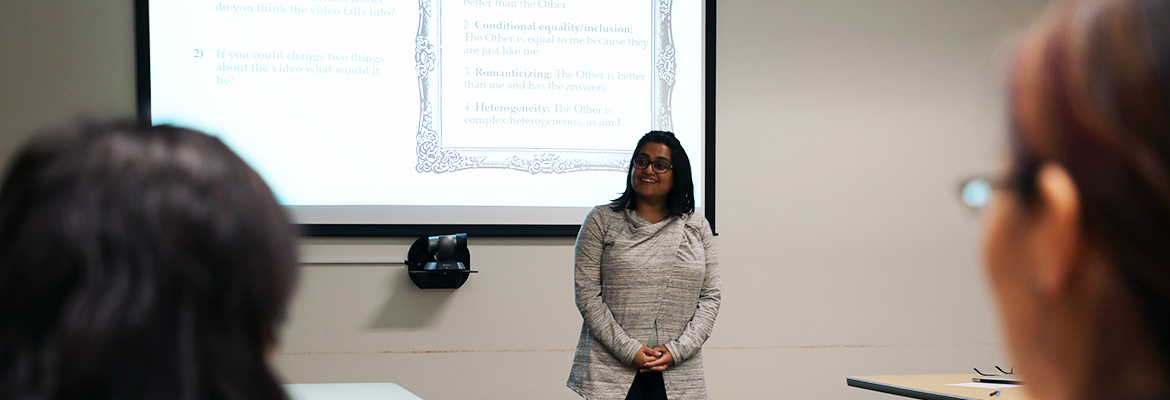On November 9, UBC staff, faculty, and students were invited to discuss and deconstruct narratives about Muslims and marginalized communities. The workshop was hosted by CTLT Indigenous Initiatives and facilitated by Rabia Mir, a graduate student in the Department of Educational Studies. Participants were encouraged to critically think about how narratives are created, how they unconsciously inform opinions, and how to address them.
Challenging misconceptions
Workshop participants were asked to jot down answers to several questions, including questions about how many Muslims are in the world, how many refugees are in the world, and which countries are most affected by terrorism.
Mir then played a video where she asked people around UBC and downtown Vancouver the same questions. Workshop participants, along with those in the video, were surprised by many of the answers.
For example, in her video Mir explains that there are 1.8 billion Muslims and 22.5 million refugees in the world. Among the countries most affected by terrorism are Iraq, Afghanistan, Nigeria, Pakistan, and Syria. The video and activity highlighted that there is often misinformation or a lack of knowledge about Muslims.
The video is one component of the Muslim Literacy Project, which Mir founded to “help disrupt many of the characterizations and tropes that have been imposed upon Muslims within public and academic discourse.”
Understanding differences
Mir emphasized that among Muslims, as with any community, there are varied opinions on social, political, and legal issues. It becomes problematic when all Muslims are grouped as having the same beliefs.
“I can be Muslim and have my own sense of beliefs. All 1.8 billion people cannot believe in the same thing,” Mir said.
Mir pointed to Sharia law—which has been debated worldwide—and how it can, and has, been widely interpreted. “Throughout history, people have used Sharia to justify multiple things,” Mir said, adding that “different Muslims would define it differently.”
Workshop participants watched interviews with three Canada-based Islamic law researchers. The first scholar, Iman, explained that Sharia is based on the Quran, the word of God, and hadith, the saying and actions of the prophet Muhammad. She noted that Sharia is not a monolithic legal code, and it shifts depending on social contexts and ideals. Faisal, the second scholar, said that the distinction between Sharia law and Islamic jurisprudence has eroded—which has led to human work being presented as divine will. The final scholar, Nakita, defined Sharia as a path and way of life. She describes it as a living and breathing legal code or process based on societal contexts and interpretations.
Workshop participants said that what stood out to them after watching the interviews was how Sharia seems to have a fluid interpretation, and can be part of an ongoing conversation that changes over time.
Mir noted that it is important to understand the power in interpretation. “If something is an open-ended and ambiguous thing, people will use it, and have used it historically to justify whatever they think is right,” she said.
Addressing narratives
Workshop participants also discussed anti-Muslim racism, and whether it was a problem of ignorance, or something more. Mir explained that she purposefully chose the term “racism” over “Islamophobia”.
“Islamophobia centres the person who is scared,” Mir said. “Muslims are not a race, but a lot of the Muslims…who are outwardly discriminated against, are racialized. Islamophobia doesn’t get to the more systemic nature of [discrimination], which I think racism gets to.”
To further explore the issue, Mir shared a video where young Muslims completed the statement, “I am Muslim, but I am not…”, which addressed and broke down many misconceptions and stereotypes they had experienced. As a follow up, Mir showed a response video, where another group of young Muslims completed the statement, “I am Muslim, but…” which addressed more systemic issues.
“The idea was to give you some tools, some narratives. I think there’s so much that we just consume without questioning,” Mir said. She hopes that through the workshop, participants are better able to dispel stereotypes and critically think about narratives.

